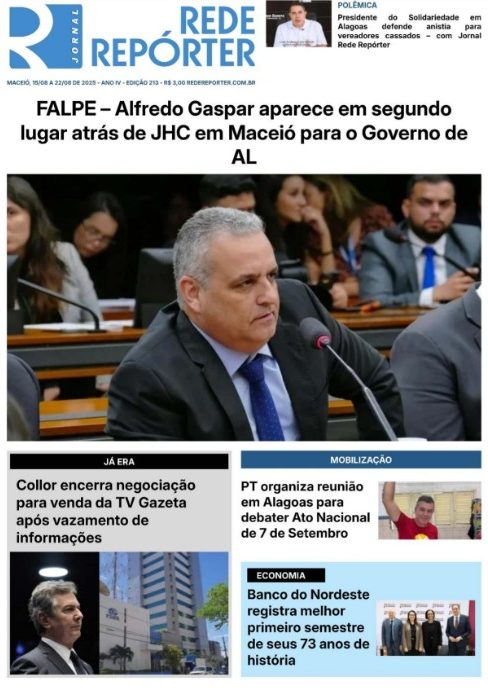He announced that two task forces will be created: the Global Alliance against Hunger and Poverty and the Global Mobilization against Climate Change. The Brazilian president also mentioned the tragedy in Rio Grande do Sul as a result of the passage of an extratropical cyclone. According to the latest balance, released at 6 p.m. on Saturday (9), the state has recorded 41 deaths, and 46 people are still missing. Eighty-eight municipalities are in a state of public calamity. “This calls our attention because phenomena like this have been happening in different parts of our planet,” he pointed out. Yesterday (9), during a speech at another summit event, Lula called for resources from rich countries to fight global warming. “Nature continues to demonstrate that we need to take care of it with much more care,” added the president.
The G20 brings together 19 of the world’s largest economies and the European Union. The African Union also became a permanent member during the summit in India. Hunger combat “We need to redouble efforts to achieve the goal of ending hunger in the world by 2030, otherwise, we will face the largest multilateral failure in recent years. Taking action to combat climate change requires political will and determination from leaders, as well as resources and technology transfer,” said Lula about the key lines of the Brazilian presidency. He also emphasized the need for emerging countries to have more participation in the decisions of the World Bank and the International Monetary Fund (IMF). “The unsustainable external debt of the poorest countries needs to be addressed. The WTO [World Trade Organization] needs to be revitalized, and its dispute settlement system needs to be resumed. To regain its political strength, the UN Security Council needs the presence of new developing countries among its permanent and non-permanent members,” he defended.
G20 in Brazil The Brazilian presidency will begin on December 1, 2023, and end on November 30, 2024. The G20 agenda will be decided and implemented by the Brazilian government, with direct support from India, the previous presidency, and South Africa, the country that will hold the mandate in 2025. This system is known as troika and is one of the group’s differentials in relation to other international organizations. Between December 2023 and November 2024, Brazil must organize over 100 official meetings in various cities in the country, including about 20 ministerial meetings, 50 high-level meetings, and parallel events. The highlight will be the 19th Summit of Heads of State and Government of the G20, on November 18 and 19, 2024, in Rio de Janeiro. According to Lula, in the G20, Brazil intends to organize work around three general guidelines. Firstly, he proposes an approach between the policy track, which is broader and discusses public policies, and the finance track, which discusses financing issues, in a way that “coordinates and works more integrated.” “It is no use waking up the best public policy if we do not allocate the necessary resources for its implementation,” he evaluated. The Brazilian presidency is also expected to create a dialogue channel between leaders and civil society, ensuring that civil society engagement groups, professional associations, and public bodies have the opportunity to report their conclusions and recommendations to government representatives. According to the president, it is also necessary to avoid discussions on geopolitical issues, such as wars, in order not to empty the agenda of discussions in the various instances of the bloc. “We are not interested in a divided G20. Only with joint action can we confront the challenges of our days. We need peace and cooperation instead of conflicts,” said the president. International Agenda This is the first time that Brazil has assumed the presidency of the G20 since its creation in 1999. The country has been present since the beginning when the world’s 20 largest economies gathered in search of a solution to the severe financial crisis that shook all markets and led to the collapse of a large number of banks and other companies. The group originally consisted of finance ministers and central bank presidents. In 2008, to address a new international financial crisis, it adopted its current format with heads of state and government. “Our joint action allowed us to face the most critical moments, but it was insufficient to correct the structural mistakes of neoliberalism. The global financial architecture has changed little, and the basis for a new economic governance has not been laid. New urgencies have emerged, challenges have accumulated and worsened, we live in a world where wealth is more concentrated, where millions of human beings still go hungry, where sustainable development is always under threat, and where governance institutions still reflect the reality of the mid-twentieth century,” warned Lula in his speech in New Delhi. For him, reducing inequalities should be at the center of the international agenda. “We will only be able to face all these problems if we address the issue of inequality. Income inequality, access to health, education, and food, gender and racial inequality, and representation inequality are at the root of all these anomalies,” he emphasized. In addition to the leaders of the G20 member countries – South Africa, Germany, Saudi Arabia, Argentina, Australia, Brazil, Canada, China, South Korea, United States, France, India, Indonesia, Italy, Japan, Mexico, United Kingdom, Russia, Turkey, and the European Union – the leaders of Bangladesh, Egypt, United Arab Emirates, Spain, Mauritius, Nigeria, Oman, the Netherlands, Singapore, and the African Union also participated in the summit as invited guests of the Indian presidency. The main document resulting from the 18th G20 Summit was the Leaders’ Declaration, which included issues such as the need for sustainable development, economic and scientific cooperation, actions against inequality, and the reduction of suffering caused by wars. The Indian presidency began in December 2022 under the motto “One Earth, One Family, One Future.” During the period, the G20 had sustainable lifestyles, technology, inclusive growth, multilateralism, and women’s leadership as general priorities.









